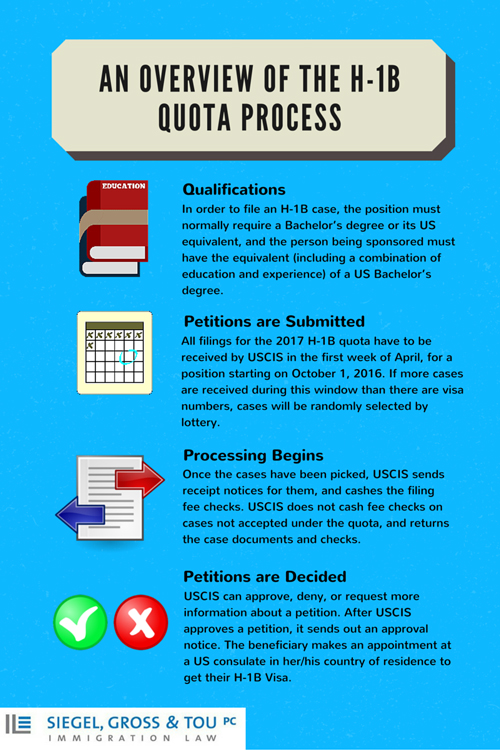An Overview of the H-1B Quota Process
H-1B quota season for Fiscal Year 2017 is coming quickly—since cases must be filed by April 1, 2016. We anticipate a very busy quota season.
In order to file an H-1B case, the position must normally require a Bachelor’s degree or its US equivalent, and the person being sponsored must have the equivalent (including a combination of education and experience) of a US Bachelor’s degree.
Your cases will need full project information and supporting documentation for filing. All filings for the Fiscal Year 2017 H-1B quota have to be received by USCIS in the first week of April, for a position starting on October 1, 2016.

USCIS will likely accept cases under the quota over a range of days this year, as they have in years past, (Usually the first five business days of April). Once that range is defined, cases received by USCIS during that range are treated equally for purposes of inclusion and selection under the lottery – there is no advantage to filing on the first day, once a multiple-day range for case acceptance has been defined. Accordingly, we file all cases on a first-in first-out basis.
After the last day for accepting the cases for inclusion in the selection process has passed, USCIS begins selecting cases. Again, cases received by USCIS during the acceptance period are treated equally for purposes of inclusion and selection under the lottery. Once the cases have been picked, USCIS sends receipt notices for them, and cashes the filing fee checks. USCIS does not cash your fee checks on cases not accepted under the quota, and starts returning the case documents and checks.
Once cases have been picked up, USCIS starts processing them. It means one of the following three things can happen; USCIS issues an approval, or USCIS denies the case; finally USCIS can also issue an RFE, which is request for additional evidence to establish eligibility for petition approval. USCIS suspends processing on cases it has sent out RFEs for till it receives the additional information it has requested, or the last day to submit additional information has passed. USCIS will either approve or deny a petition based on this additional evidence.
After USCIS approves a petition, it sends out an approval notice. The approval notice in itself does not grant the beneficiary admittance into the United States or authorization to work in the United States. The beneficiary has to make an appointment at a United States consulate in her/his country of residence to get a H-1B Visa. The wait time for visa appointments can be found here.
For H-1B visas approved for Fiscal Year 2017, the earliest an employee can start working is October 1, 2016. Also, H-4 petitions for dependents can be filed after the case has been picked up in the lottery.
In order to start a quota case, please send documents to our quota intake email quota@sgimmigration.com
Disclaimer: The information provided here is not to be construed as legal advice nor presumed to be indefinitely up to date. This information is of a general nature and is not intended to apply to any specific or particular circumstance.

